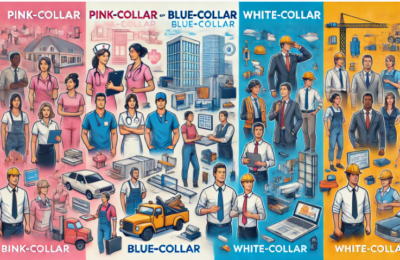Teaching is a noble profession that requires dedication, patience, and a passion for helping others learn and grow. However, many teachers face challenges such as low pay, long hours, and limited opportunities for advancement. As a result, some educators may feel stuck or unfulfilled in their current roles, leading them to consider alternative career paths.
What You’ll Learn
In this article, you’ll discover:
- 10 best alternative careers for teachers that leverage their valuable skills
- Job descriptions, responsibilities, and transferable skills for each career
- Potential for career growth, success, and increased job satisfaction
- Salary and job outlook for each alternative career
- Required skills, qualifications, and transition tips for a smooth career change
- Challenges and considerations to keep in mind when exploring new careers
By exploring these alternative careers, teachers can find new ways to apply their expertise, make a positive impact, and achieve greater professional fulfillment. So, let’s dive in and discover the exciting opportunities that await!
1. Corporate Training and Development Manager

Job Description and Responsibilities
Corporate training and development managers are responsible for designing, implementing, and evaluating training programs that help employees develop the skills and knowledge necessary to succeed in their roles. They assess the organization’s training needs, create engaging learning materials, and facilitate workshops and seminars.
Transferable Skills from Teaching
Teachers possess many transferable skills that make them well-suited for corporate training and development roles. These include:
- Curriculum development and instructional design
- Effective communication and presentation skills
- Ability to engage and motivate learners
- Assessment and evaluation of learning outcomes
Potential for Career Growth and Success
Corporate training and development managers have excellent opportunities for career growth and advancement. With experience, they can move into higher-level positions such as director of learning and development or chief learning officer. They can also specialize in specific areas, such as leadership development or e-learning.
Salary and Job Outlook
According to the U.S. Bureau of Labor Statistics, the median annual wage for training and development managers was $115,640 in May 2020. Employment in this field is projected to grow 7% from 2019 to 2029, faster than the average for all occupations.
Required Skills and Qualifications
To succeed as a corporate training and development manager, you’ll need:
- Strong instructional design and facilitation skills
- Excellent communication and interpersonal skills
- Knowledge of adult learning principles and training methodologies
- Familiarity with e-learning platforms and tools
- Project management and organizational skills
Transition Tips and Strategies
To transition from teaching to corporate training and development:
- Highlight your relevant skills and experiences in your resume and cover letter
- Pursue professional certifications, such as the Certified Professional in Learning and Performance (CPLP)
- Network with professionals in the field and attend industry conferences
- Gain experience by volunteering to train or mentor colleagues or community members
Challenges and Considerations
Transitioning from teaching to corporate training and development can come with challenges, such as:
- Adapting to a business-focused environment and corporate culture
- Managing multiple projects and stakeholders with competing priorities
- Staying up-to-date with rapidly evolving training technologies and methodologies
However, with the right mindset, skills, and support, former teachers can thrive in this dynamic and rewarding field.
2. Educational Consultant

Job Description and Responsibilities
Educational consultants work with schools, districts, and educational organizations to improve teaching practices, curricula, and student outcomes. They analyze data, conduct research, and provide expert advice on instructional strategies, technology integration, and professional development.
Opportunities for Freelance Work and Consulting
Educational consulting offers numerous opportunities for freelance work and self-employment. Teachers can leverage their expertise to provide consulting services to schools, non-profits, and education technology companies.
Leveraging Teaching Experience to Help Organizations and Individuals
Teachers have firsthand experience with the challenges and opportunities in education, making them uniquely qualified to help organizations and individuals navigate the complex landscape of teaching and learning.
Salary and Job Outlook
Salaries for educational consultants vary depending on factors such as experience, location, and type of employer. According to PayScale, the average annual salary for educational consultants is $64,602. The job outlook for educational consulting is positive, as schools and organizations increasingly seek expert guidance to improve student outcomes and adapt to changing educational needs.
Required Skills and Qualifications
To succeed as an educational consultant, you’ll need:
- In-depth knowledge of pedagogy, curriculum design, and assessment
- Strong research, data analysis, and problem-solving skills
- Excellent communication and presentation skills
- Ability to build relationships and collaborate with diverse stakeholders
- Entrepreneurial mindset and business acumen (for freelance consultants)
Transition Tips and Strategies
To transition from teaching to educational consulting:
- Develop a clear niche or area of expertise
- Build a strong professional network and seek referrals
- Create a compelling marketing message and online presence
- Offer pro bono or discounted services to build your portfolio
- Continuously update your knowledge and skills through professional development
Challenges and Considerations
Transitioning from teaching to educational consulting can present challenges, such as:
- Building a client base and securing steady work
- Managing the financial and administrative aspects of running a business
- Staying current with educational trends, research, and best practices
- Balancing multiple projects and client needs
However, for teachers who are passionate about education and enjoy problem-solving and collaboration, educational consulting can be a fulfilling and impactful career path.
3. Instructional Designer

Job Description and Responsibilities
Instructional designers create engaging and effective learning experiences for students in various settings, including K-12, higher education, and corporate training. They design courses, develop learning materials, and utilize technology to support learning outcomes.
Demand for E-Learning and Online Course Development
The demand for e-learning and online course development has grown significantly in recent years, particularly in the wake of the COVID-19 pandemic. Instructional designers with experience creating engaging online learning experiences are in high demand across industries.
Utilizing Teaching Skills to Create Engaging Learning Materials
Teachers have a wealth of experience creating lesson plans, assessments, and learning materials that engage and motivate students. These skills are directly transferable to instructional design, where the goal is to create learning experiences that are both effective and engaging.
Salary and Job Outlook
According to the U.S. Bureau of Labor Statistics, the median annual wage for instructional coordinators, which includes instructional designers, was $66,970 in May 2020. Employment in this field is projected to grow 6% from 2019 to 2029, faster than the average for all occupations.
Required Skills and Qualifications
To succeed as an instructional designer, you’ll need:
- Strong knowledge of learning theories, instructional design models, and pedagogy
- Familiarity with e-learning authoring tools and learning management systems (LMS)
- Excellent written and verbal communication skills
- Ability to collaborate with subject matter experts and other stakeholders
- Project management and problem-solving skills
Transition Tips and Strategies
To transition from teaching to instructional design:
- Familiarize yourself with instructional design models and e-learning authoring tools
- Develop a portfolio showcasing your lesson plans, learning materials, and assessments
- Pursue professional development opportunities, such as workshops or certifications
- Network with instructional designers and join professional organizations, such as the Association for Talent Development (ATD)
Challenges and Considerations
Transitioning from teaching to instructional design can come with challenges, such as:
- Adapting to working with adult learners and corporate clients
- Staying current with rapidly evolving e-learning technologies and trends
- Collaborating with subject matter experts and managing competing priorities
- Balancing creativity with the constraints of project timelines and budgets
However, for teachers who enjoy creating engaging learning experiences and are comfortable with technology, instructional design can be a rewarding and impactful career path.
4. Educational Sales Representative

Job Description and Responsibilities
Educational sales representatives sell educational products and services, such as textbooks, software, and technology, to schools, districts, and universities. They build relationships with educators, demonstrate products, and provide ongoing support to help customers effectively implement the solutions they purchase.
Opportunities in Educational Technology and Publishing
The educational technology and publishing industries offer numerous opportunities for educational sales representatives. With the growing demand for digital learning solutions and innovative educational resources, teachers with classroom experience and a passion for technology can excel in this field.
Using Teaching Background to Build Rapport with Clients
Teachers have a unique advantage as educational sales representatives because they understand the challenges and needs of educators firsthand. They can use their classroom experience to build rapport with clients, provide valuable insights, and demonstrate how products can effectively support teaching and learning.
Salary and Job Outlook
Salaries for educational sales representatives vary depending on factors such as experience, location, and type of employer. According to Glassdoor, the average annual salary for educational sales representatives is $56,286. The job outlook for educational sales is positive, as schools and districts continue to invest in new technologies and resources to support student learning.
Required Skills and Qualifications
To succeed as an educational sales representative, you’ll need:
- Strong knowledge of educational products, services, and trends
- Excellent communication, presentation, and relationship-building skills
- Ability to understand customer needs and provide tailored solutions
- Familiarity with sales processes, including prospecting, qualifying leads, and closing deals
- Comfort with technology and the ability to demonstrate products effectively
Transition Tips and Strategies
To transition from teaching to educational sales:
- Research educational technology and publishing companies and their products
- Tailor your resume to highlight your relevant skills and experiences
- Network with educational sales professionals and attend industry conferences
- Consider pursuing a sales certification, such as the Certified Sales Professional (CSP)
- Be prepared to showcase your passion for education and how it aligns with the company’s mission
Challenges and Considerations
Transitioning from teaching to educational sales can present challenges, such as:
- Adapting to a sales-focused role and meeting quotas
- Managing rejection and maintaining resilience in the face of setbacks
- Balancing travel and time out of the office with personal commitments
- Staying up-to-date with rapidly evolving educational technologies and trends
However, for teachers who enjoy building relationships, problem-solving, and making a positive impact on education, educational sales can be a rewarding and lucrative career path.
5. Museum Educator

Job Description and Responsibilities
Museum educators develop and deliver educational programs, tours, and workshops that engage visitors and promote learning in museums, galleries, and historical sites. They collaborate with curators and other museum staff to create content that aligns with the museum’s collections and mission.
Opportunities for Creative Teaching in a Museum Setting
Museum education offers unique opportunities for teachers to engage in creative, interdisciplinary teaching. From designing hands-on activities to leading interactive tours, museum educators have the freedom to develop innovative programs that bring history, art, and science to life.
Potential for Community Engagement and Outreach
Museum educators play a key role in community engagement and outreach. They work with schools, community organizations, and underserved populations to make museum resources accessible and relevant to diverse audiences.
Salary and Job Outlook
Salaries for museum educators vary depending on factors such as experience, location, and type of museum. According to the American Alliance of Museums, the median annual salary for museum education positions is $48,000. The job outlook for museum education is stable, with ongoing demand for engaging and inclusive educational programming.
Required Skills and Qualifications
To succeed as a museum educator, you’ll need:
- Strong knowledge of the museum’s collections, content areas, and educational best practices
- Excellent communication, presentation, and interpersonal skills
- Creativity and the ability to design engaging, age-appropriate educational programs
- Familiarity with inclusive teaching practices and strategies for engaging diverse audiences
- Comfort with technology and the ability to incorporate digital tools into educational programs
Transition Tips and Strategies
To transition from teaching to museum education:
- Gain experience through volunteering or interning at museums, galleries, or historical sites
- Tailor your resume to highlight your relevant skills and experiences, such as lesson planning and student engagement
- Network with museum professionals and attend industry conferences, such as the American Alliance of Museums Annual Meeting
- Consider pursuing a graduate degree in museum studies or a related field
- Demonstrate your passion for the museum’s collections and mission in your application materials
Challenges and Considerations
Transitioning from teaching to museum education can come with challenges, such as:
- Adapting to working with diverse, multi-age audiences and varying group sizes
- Balancing the needs and interests of different museum stakeholders, including curators, donors, and visitors
- Managing limited budgets and resources for educational programs
- Staying current with museum education trends and best practices
However, for teachers who are passionate about lifelong learning and enjoy the unique setting and resources of museums, museum education can be a fulfilling and impactful career path.
6. Educational Writer or Editor

Job Description and Responsibilities
Educational writers and editors create and refine content for textbooks, educational websites, lesson plans, and other instructional materials. They research and write engaging, accurate content that aligns with educational standards and learning objectives.
Opportunities in Textbook Publishing, Educational Websites, and More
The field of educational writing and editing offers diverse opportunities, from working with traditional textbook publishers to creating content for online learning platforms and educational startups.
Utilizing Writing and Research Skills Developed as a Teacher
Teachers have strong writing and research skills honed through years of creating lesson plans, assignments, and instructional materials. These skills are directly transferable to educational writing and editing, where the goal is to create clear, accurate, and engaging content that supports learning.
Salary and Job Outlook
Salaries for educational writers and editors vary depending on factors such as experience, location, and type of employer. According to PayScale, the average annual salary for educational writers is $50,741. The job outlook for educational writing and editing is positive, with ongoing demand for high-quality, standards-aligned educational content.
Required Skills and Qualifications
To succeed as an educational writer or editor, you’ll need:
- Excellent writing, editing, and proofreading skills
- Strong research and fact-checking abilities
- Familiarity with educational standards and learning objectives
- Ability to understand and adapt to different writing styles and formats
- Collaboration and communication skills for working with subject matter experts and other stakeholders
Transition Tips and Strategies
To transition from teaching to educational writing and editing:
- Build a portfolio of writing samples, such as lesson plans, blog posts, or articles
- Familiarize yourself with educational publishing standards and style guides
- Network with educational writers, editors, and publishers through professional organizations, such as the Educational Writers Association
- Consider freelance or part-time writing and editing projects to gain experience and build your resume
- Highlight your subject matter expertise and classroom experience in your applications and cover letters
Challenges and Considerations
Transitioning from teaching to educational writing and editing can present challenges, such as:
- Adapting to the unique constraints and requirements of educational publishing, such as strict word counts and formatting guidelines
- Collaborating with multiple stakeholders, including subject matter experts, designers, and project managers
- Meeting tight deadlines and managing multiple projects simultaneously
- Staying current with changes in educational standards and trends in instructional design
However, for teachers who enjoy writing, research, and creating engaging educational content, educational writing and editing can be a rewarding and intellectually stimulating career path.
7. Human Resources Trainer

Job Description and Responsibilities
Human resources trainers design and deliver training programs that help employees develop the skills and knowledge needed to succeed in their roles and contribute to organizational goals. They assess training needs, create interactive workshops, and evaluate the effectiveness of training initiatives.
Transferable Skills in Communication, Leadership, and Mentoring
Teachers possess many transferable skills that are valuable in human resources training, such as strong communication, leadership, and mentoring abilities. They have experience breaking down complex topics, facilitating engaging discussions, and providing constructive feedback to support growth and development.
Potential for Impacting Employee Development and Success
Human resources trainers play a crucial role in employee development and success. By designing and delivering effective training programs, they help employees acquire new skills, adapt to changes in the workplace, and advance in their careers.
Salary and Job Outlook
Salaries for human resources trainers vary depending on factors such as experience, location, and type of employer. According to the U.S. Bureau of Labor Statistics, the median annual wage for training and development specialists was $61,210 in May 2020. Employment in this field is projected to grow 9% from 2019 to 2029, faster than the average for all occupations.
Required Skills and Qualifications
To succeed as a human resources trainer, you’ll need:
- Strong knowledge of adult learning principles and training methodologies
- Excellent communication, facilitation, and presentation skills
- Ability to assess training needs and design engaging, interactive learning experiences
- Familiarity with e-learning platforms and instructional design tools
- Collaboration and relationship-building skills for working with diverse stakeholders
Transition Tips and Strategies
To transition from teaching to human resources training:
- Highlight your relevant skills and experiences, such as lesson planning, differentiated instruction, and classroom management
- Pursue professional certifications, such as the Certified Professional in Talent Development (CPTD) or the SHRM Certified Professional (SHRM-CP)
- Network with human resources professionals and attend industry conferences, such as the ATD International Conference & Exposition
- Seek out opportunities to deliver training or workshops within your current organization or through volunteer work
- Tailor your resume and cover letter to emphasize your transferable skills and passion for employee development
Challenges and Considerations
Transitioning from teaching to human resources training can come with challenges, such as:
- Adapting to the unique culture and expectations of a corporate environment
- Navigating complex organizational structures and stakeholder relationships
- Staying current with evolving workplace trends and training technologies
- Balancing the need for engaging, interactive training with the constraints of limited time and resources
However, for teachers who are passionate about helping others grow and develop, human resources training can be a fulfilling and impactful career path.
8. Educational Entrepreneur

Opportunities for Creating Educational Products or Services
Educational entrepreneurship offers teachers the opportunity to create innovative products or services that address unmet needs in the education market. From developing educational apps and software to creating unique curricula and learning resources, teachers can leverage their expertise to build successful businesses.
Leveraging Teaching Experience to Identify Market Needs
Teachers have firsthand experience with the challenges and gaps in the education system, making them uniquely qualified to identify market needs and develop solutions. They can use their deep understanding of student learning, classroom dynamics, and educational best practices to create products and services that truly make a difference.
Potential for Flexibility and Financial Success
Educational entrepreneurship offers the potential for greater flexibility and financial success compared to traditional teaching roles. By building their own businesses, teachers can have more control over their schedules, income, and professional growth.
Required Skills and Qualifications
To succeed as an educational entrepreneur, you’ll need:
- Creativity and innovation to develop unique, high-quality educational products or services
- Strong business acumen, including skills in marketing, finance, and operations
- Ability to conduct market research and identify target customers
- Excellent communication and networking skills to build partnerships and secure funding
- Resilience and adaptability to navigate the challenges of starting and growing a business
Transition Tips and Strategies
To transition from teaching to educational entrepreneurship:
- Identify a specific problem or need in the education market that aligns with your expertise and passion
- Conduct thorough market research to validate your business idea and identify potential competitors
- Develop a solid business plan that outlines your product or service, target market, financial projections, and growth strategy
- Build a strong network of mentors, advisors, and potential partners who can provide guidance and support
- Consider pursuing additional education or training in entrepreneurship, such as a Master of Business Administration (MBA) or startup accelerator program
Challenges and Considerations
Transitioning from teaching to educational entrepreneurship can present significant challenges, such as:
- Navigating the complexities of starting and running a business, including legal, financial, and operational aspects
- Securing funding and managing cash flow, particularly in the early stages of the business
- Building a strong team and delegating responsibilities effectively
- Balancing the demands of entrepreneurship with personal and family commitments
However, for teachers who are passionate about innovation and making a lasting impact on education, educational entrepreneurship can be a challenging but immensely rewarding career path.
9. Educational Policy Analyst

Job Description and Responsibilities
Educational policy analysts research, analyze, and develop policies related to education at the local, state, or federal level. They examine data, trends, and best practices to inform policy decisions and make recommendations for improving educational outcomes.
Opportunities to Influence Educational Policy Decisions
Educational policy analysts have the opportunity to shape the future of education by influencing policy decisions at various levels. They can use their expertise and insights to advocate for policies that promote equity, access, and excellence in education.
Utilizing Teaching Experience to Provide Valuable Insights
Teachers bring valuable frontline experience and insights to educational policy discussions. They have a deep understanding of the challenges faced by students, educators, and schools, and can provide practical perspectives on how policies impact teaching and learning.
Salary and Job Outlook
Salaries for educational policy analysts vary depending on factors such as experience, location, and type of employer. According to PayScale, the average annual salary for education policy analysts is $62,055. The job outlook for educational policy analysts is positive, with ongoing demand for data-driven decision-making and evidence-based policies in education.
Required Skills and Qualifications
To succeed as an educational policy analyst, you’ll need:
- Strong research, data analysis, and critical thinking skills
- Excellent written and verbal communication skills, including the ability to present complex information clearly and concisely
- Knowledge of education systems, policies, and trends at the local, state, and federal levels
- Familiarity with statistical analysis and data visualization tools
- Ability to collaborate with diverse stakeholders and build consensus around policy recommendations
Transition Tips and Strategies
To transition from teaching to educational policy analysis:
- Pursue advanced education in public policy, education policy, or a related field, such as a Master of Public Policy (MPP) or Ph.D. in Education Policy
- Gain experience through internships, fellowships, or volunteer work with education policy organizations or government agencies
- Build a strong network of education policy professionals, researchers, and advocates
- Develop a portfolio of writing samples, such as policy briefs, research papers, or op-eds, that demonstrate your analytical and communication skills
- Highlight your teaching experience and the unique insights it provides in your applications and interviews
Challenges and Considerations
Transitioning from teaching to educational policy analysis can come with challenges, such as:
- Navigating the complex and often slow-moving world of policymaking and bureaucracy
- Balancing competing priorities and interests from various stakeholders, including educators, administrators, policymakers, and the public
- Staying current with rapidly evolving education trends, research, and best practices
- Communicating complex policy issues and recommendations to diverse audiences
However, for teachers who are passionate about systemic change and making a broader impact on education, educational policy analysis can be a challenging but rewarding career path.
10. Nonprofit Educational Program Coordinator

Job Description and Responsibilities
Nonprofit educational program coordinators develop, implement, and evaluate educational programs and initiatives for nonprofit organizations focused on education, youth development, or community outreach. They design curricula, recruit and train volunteers, and collaborate with community partners to deliver impactful programs.
Opportunities to Make a Difference in Underserved Communities
Nonprofit educational program coordinators have the opportunity to make a significant difference in the lives of students and families in underserved communities. By developing and implementing targeted programs, they can address educational inequities, provide enrichment opportunities, and support the holistic development of children and youth.
Utilizing Teaching Skills to Develop and Implement Educational Programs
Teachers possess a wide range of skills that are directly applicable to nonprofit educational program coordination, including curriculum development, instructional design, and student engagement. They can use their teaching experience to create innovative, evidence-based programs that meet the unique needs of the communities they serve.
Salary and Job Outlook
Salaries for nonprofit educational program coordinators vary depending on factors such as experience, location, and the size and focus of the organization. According to PayScale, the average annual salary for nonprofit program coordinators is $42,574. The job outlook for nonprofit educational program coordinators is positive, with ongoing demand for high-quality, community-based educational programs.
Required Skills and Qualifications
To succeed as a nonprofit educational program coordinator, you’ll need:
- Strong knowledge of educational best practices, curriculum development, and program evaluation
- Excellent communication, collaboration, and relationship-building skills
- Experience working with diverse communities and understanding of cultural competency
- Familiarity with grant writing, budgeting, and program management
- Passion for social justice and a commitment to educational equity
Transition Tips and Strategies
To transition from teaching to nonprofit educational program coordination:
- Gain experience through volunteering or interning with education-focused nonprofit organizations
- Build a strong network of nonprofit professionals, community leaders, and education advocates
- Develop a portfolio of relevant projects, such as curriculum samples, program proposals, or community outreach initiatives
- Highlight your teaching experience and the transferable skills it provides in your applications and interviews
- Consider pursuing additional education or training in nonprofit management, community development, or a related field
Challenges and Considerations
Transitioning from teaching to nonprofit educational program coordination can present challenges, such as:
- Adapting to the unique culture and expectations of the nonprofit sector, which may differ from traditional school environments
- Navigating limited budgets and resources while striving to deliver high-quality programs
- Balancing multiple roles and responsibilities, including program development, volunteer management, and community outreach
- Staying current with evolving best practices and trends in educational programming and community development
However, for teachers who are passionate about making a difference in underserved communities and working towards educational equity, nonprofit educational program coordination can be a fulfilling and impactful career path.
Frequently Asked Questions (FAQ)
1. What skills do teachers possess that make them well-suited for alternative careers?
Teachers possess a wide range of transferable skills that make them well-suited for alternative careers, including:
- Strong communication and presentation skills
- Ability to break down complex information and explain it clearly
- Experience designing and delivering engaging, effective learning experiences
- Expertise in assessing and evaluating performance and providing constructive feedback
- Strong organizational, time management, and problem-solving skills
- Ability to build relationships and collaborate with diverse stakeholders
2. How can teachers identify alternative careers that align with their skills and interests?
Teachers can identify alternative careers that align with their skills and interests by:
- Reflecting on their strengths, passions, and areas of expertise
- Researching careers that leverage their transferable skills and align with their values
- Conducting informational interviews with professionals in fields of interest
- Attending career fairs, workshops, or networking events focused on education and related industries
- Working with a career coach or mentor to explore options and develop a transition plan
3. What steps can teachers take to prepare for a successful career transition?
To prepare for a successful career transition, teachers can:
- Identify and highlight their transferable skills in their resume, cover letter, and online profiles
- Pursue additional education, certifications, or training to fill any skill gaps or meet industry requirements
- Build a strong professional network and seek out mentors in their desired field
- Gain relevant experience through volunteering, interning, or freelance work
- Tailor their application materials and interview responses to emphasize the value they can bring to the new role
4. How can teachers address potential concerns from employers about their lack of direct experience in a new field?
Teachers can address potential concerns from employers about their lack of direct experience by:
- Highlighting their transferable skills and how they apply to the new role
- Providing concrete examples of how they have successfully adapted to new challenges and learned new skills in the past
- Demonstrating their passion for the field and their commitment to professional growth and development
- Leveraging their network and seeking referrals or recommendations from professionals in the field
- Emphasizing the unique perspectives and insights they can bring from their teaching experience
5. What resources are available to support teachers in exploring and pursuing alternative careers?
There are many resources available to support teachers in exploring and pursuing alternative careers, including:
- Professional associations and networks focused on education and related fields, such as the Association for Talent Development (ATD) or the American Educational Research Association (AERA)
- Online job boards and career resources, such as LinkedIn, Indeed, or Idealist
- Career coaching and mentoring programs offered through universities, professional organizations, or private providers
- Workshops, webinars, and conferences focused on career transitions and professional development
- Online courses and certification programs to build new skills and credentials
By leveraging these resources and taking a proactive, strategic approach to their career transition, teachers can successfully navigate the challenges and opportunities of pursuing alternative careers that lead to greater success and fulfillment.
Key Takeaways
- Teachers possess a wide range of valuable skills, such as communication, instructional design, and problem-solving, that are highly transferable to alternative careers.
- Alternative careers for teachers span diverse fields, including corporate training, educational consulting, instructional design, educational sales, museum education, educational writing and editing, human resources, educational entrepreneurship, policy analysis, and nonprofit program coordination.
- To identify alternative careers that align with their skills and interests, teachers should reflect on their strengths, research potential paths, and seek guidance from mentors and career coaches.
- Successful career transitions require strategic planning, including highlighting transferable skills, pursuing relevant education and training, building a strong network, and gaining practical experience.
- Teachers can address concerns about lack of direct experience by emphasizing their unique perspectives, adaptability, and passion for professional growth.
- Numerous resources, such as professional associations, job boards, coaching programs, and online courses, are available to support teachers in exploring and pursuing alternative careers.
By exploring these alternative career paths and leveraging their valuable skills and experiences, teachers can find new opportunities for growth, impact, and fulfillment beyond the classroom. While transitions can be challenging, with the right mindset, preparation, and support, teachers can successfully navigate the journey towards a rewarding new career.
Conclusion
Teachers are uniquely positioned to thrive in a wide range of alternative careers that allow them to apply their valuable skills, expertise, and passion for helping others learn and grow. From corporate training and instructional design to educational entrepreneurship and nonprofit program coordination, the opportunities for teachers to make a meaningful impact and achieve greater success are vast and diverse.
By exploring these alternative paths and taking strategic steps to prepare for a career transition, teachers can open up new doors and find fulfilling ways to continue making a difference in the lives of learners and communities. While change can be daunting, teachers possess the resilience, adaptability, and drive to overcome challenges and succeed in new environments.
As you consider your own career journey, remember that your skills and experiences as a teacher are highly valuable and transferable. Embrace the opportunity to explore new possibilities, leverage your strengths, and pursue a path that aligns with your passions and goals. With the right resources, support, and mindset, you can successfully transition into a rewarding alternative career and achieve the success and fulfillment you deserve.











